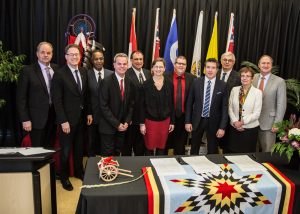BRANDON, Man. – Manitoba has taken a major step in efforts to become a global leader in Indigenous education.
Brandon University (BU) joined the province’s other post-secondary institutions and Manitoba’s school boards today to sign the Indigenous Education Blueprint (IEB). This agreement affirms their shared commitment to promoting and advancing Indigenous education, while supporting the reconciliation between Indigenous and non-Indigenous people in Manitoba. The next steps will be for the partners to establish a steering committee that will prepare an implementation plan as they work toward the blueprint’s 10 objectives. Read the full IEB.
“At Brandon University, close to 15 per cent of our students self-identify as Indigenous,” said BU Associate Vice-President of Student Services and University Registrar Tom Brophy. “It is one of BU’s priorities to reflect their contributions to our university and society, and the partnership formed through this agreement will help all institutions in the province to strengthen this relationship.”

Joining BU at Migizii Agamik – Bald Eagle Lodge in Winnipeg to sign the document were Assiniboine Community College, Canadian Mennonite University, the Manitoba Institute of Trades and Technology, Red River College, University College of the North, Université de Saint-Boniface, the University of Manitoba, University of Winnipeg and the Manitoba School Boards Association.
“The Indigenous Education Blueprint was inspired by the Calls to Action from the Truth and Reconciliation Commission,” said President Gervan Fearon, who signed the document on behalf of BU.
“This is the result of tremendous effort and cooperation from across the province’s education system, and also signifies our ongoing desire to work collaboratively to support the educational goals of Aboriginal groups.”
The ceremony also included an address by BU Aboriginal Student Council (BUASC) President Adrienne Thomas, who spoke to the group about the importance of this initiative from an Indigenous student perspective.
“It shows a commitment not only from BU, but other universities and colleges across Manitoba,” Thomas said. “I feel that it’s being implemented at the right time, following the Truth and Reconciliation Committee’s Final Report this week. I think it’s important for us to keep the momentum.”
The goals of the IEB are consistent with those of BU’s Academic Plan, which was developed in 2014.
“We strive to conduct community engagement and to promote diversity and inclusiveness at BU,” said Steven Robinson, BU’s Acting Vice-President (Academic and Provost). “This involves creating opportunities for First Nations, Métis and Inuit students, and we believe the cultural and knowledge exchange also benefits the entire university community.”
Indigenous education has been a priority at BU for decades. BU launched the Program for the Education of Native Teachers (PENT) in 1971, and four years later became the first university in Western Canada, and only the second nationwide, to introduce a Native Studies Department. The university has also developed a Department of Visual and Aboriginal Art, built the He Oyate Tawapi ceremonial room and opened the Indigenous Peoples Centre to support students educationally and socially.
“Brandon University has always been one of the more progressive universities in reaching out to Aboriginal students,” said Leah LaPlante, the vice-president of the Manitoba Métis Federation Southwest Region and chair of the Brandon Urban Aboriginal Peoples’ Council. “They have the history, with programs like PENT, and this is just taking it that large step further.”
More on BU’s Indigenous engagement can be found at brandonu.ca/indigenous.
Brandon University, founded in 1899, promotes excellence in teaching, research, and scholarship, and educates students so that they can make a meaningful difference as engaged citizens and leaders.
-30-
Contact
- Brandon University
- communications@brandonu.ca
To receive any BU publication in an alternate format please contact Communications@BrandonU.ca
About BU
Success is built at Brandon University. Our growing, progressive campus welcomes a diverse and inclusive community that combines proud tradition with shared ambition. Through our excellence in teaching, research, and scholarship, we educate students to make a meaningful difference as engaged citizens and leaders. Join us at BrandonU.ca.